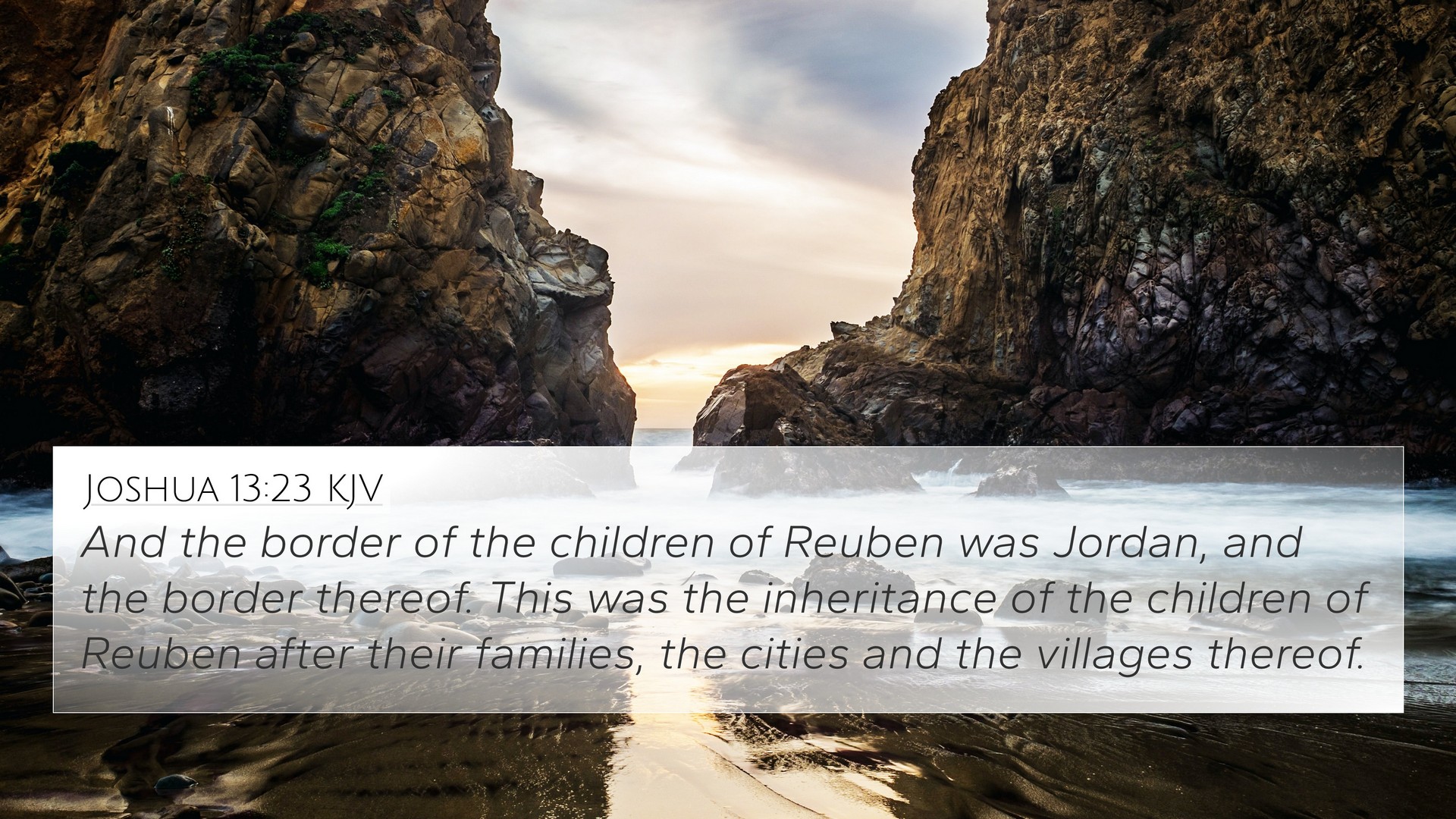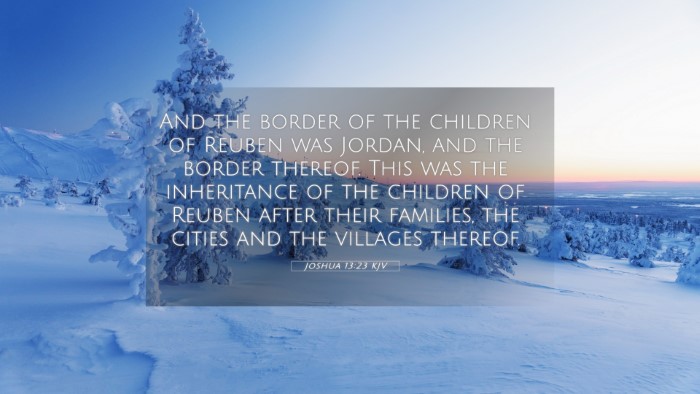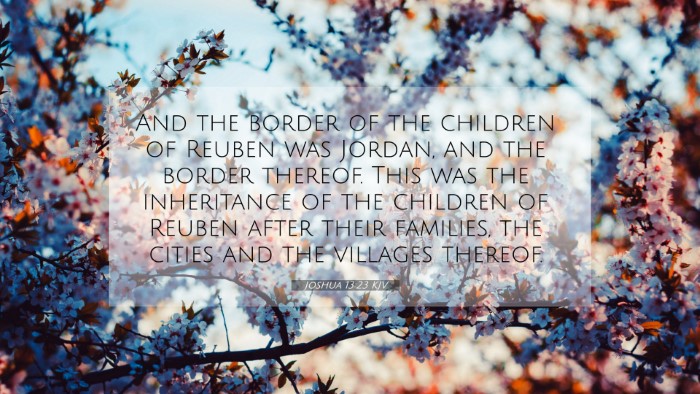Meaning and Interpretation of Joshua 13:23
Joshua 13:23 states:
"And the border of the children of Reuben was Jordan, and the border of the children of Reuben was Jordan: this was the inheritance of the children of Reuben after their families, the cities and their villages."
Overview
This verse describes the boundary and inheritance allotted to the tribe of Reuben. The precise definition of the border signifies the importance of delineating land to ensure stability and ownership among the tribes of Israel.
Commentary Insights
Matthew Henry
Matthew Henry emphasizes the collective identity of the tribes of Israel and their assigned properties. He notes that Reuben’s inheritance is connected with the broader context of the Israelite’s settlement in Canaan, underscoring God's faithfulness in fulfilling His promises to each tribe.
Albert Barnes
Albert Barnes highlights the geographical significance of the Jordan River as a border, stressing its role as both a natural boundary and a symbol of division between the tribes. He points out that Reuben, being the firstborn, holds a notable place, despite losing prominence due to past transgressions.
Adam Clarke
Adam Clarke interprets this verse in light of the historical context, noting the importance of God’s guidance in the distribution of land. Clarke stresses that the boundaries denote not just physical properties but align with God's plan for the Israelites, reinforcing the idea that God’s providence governs all aspects of life.
Cross-Referencing Biblical Texts
When studying Joshua 13:23, it is helpful to connect it with other relevant Bible verses to deepen your understanding. Here are some key cross-references:
- Numbers 32:1-5 - Describes the request of the tribes of Reuben and Gad to settle on the east side of the Jordan.
- Deuteronomy 3:12-17 - Details the land distribution for the tribes east of the Jordan River.
- Joshua 1:12-15 - Reminds the tribes of Reuben, Gad, and the half-tribe of Manasseh of their commitment to assist their fellow Israelites in conquering Canaan.
- Genesis 49:3-4 - Discusses the blessings pronounced by Jacob on his sons, including Reuben's instability as a tribe.
- Genesis 30:9-11 - Chronicles the birth of Reuben, highlighting his origin and lineage.
- 1 Chronicles 5:1-2 - Discusses the firstborn rights of Reuben and their subsequent loss due to sin.
- Hebrews 11:32-34 - References faith showing the significance of the legacy of faith within the tribes, including Reuben's storyline.
- Luke 6:45 - Ties into the concept of heritage and identity, relevant to the tribes and their inheritances.
- Romans 8:17 - Talks about inheritance, echoing the spiritual implications of belonging to God's family.
- 1 Corinthians 3:21-23 - Discusses the idea of belonging and ownership in relation to God’s people.
Thematic Connections
This verse illustrates several important themes present throughout the Scriptures:
- Divine Inheritance: The notion of land as a divine gift to the Israelites resonates deeply within both the Old and New Testaments, as seen in relevant verses discussing inheritance.
- God's Promises: The fulfillment of God's promises to the patriarchs continues through the Israelites' settlement, linking to various promises throughout scripture.
- Community and Identity: The allocation of land reflects the communal identity of Israel, which persists into the teachings of the New Testament about belonging and family in Christ.
- Faith and Obedience: The tribe's inheritance serves as a reminder of the importance of following God's commandments to receive His blessings.
- Boundaries and Belonging: The significance of borders represents both spiritual and physical belonging, applicable in Judah's later interpretations of spiritual inheritance.
Conclusion
In conclusion, Joshua 13:23 serves as a pivotal moment in Israel’s history, reflecting their journey under God's direction and promises. By analyzing this verse within its immediate context and through the lens of cross-referenced scriptures, one appreciates the depth of God’s governance over His people’s lives, their identities, and their inheritances.
Resources for Cross-Referencing Bible Studies
For individuals looking to dive deeper into their study of Scripture:
- Bible Concordance: A valuable tool to explore word meanings and cross-references effectively.
- Bible Cross-Reference Guide: Provides a comprehensive collection of related scriptures for thematic studies.
- Cross-Reference Bible Study Techniques: Guides for effective scripture linking, helping uncover thematic connections.
- Bible Reference Materials: Various published resources dedicated to scripture interconnections.
- Bible Chain References: Systematic approaches to linking related scriptures for deeper understanding.


